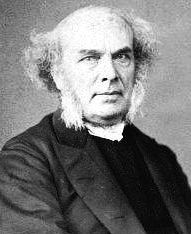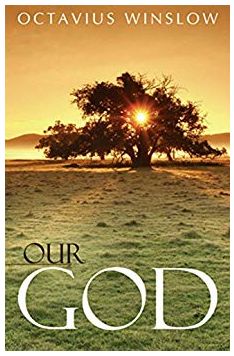Our God by Octavius Winslow is a 10 chapter look at some of the characteristics of God himself. Love, Hope, Patience, Comfort, Grace, Holiness, peace, Light, etc.
Our God
By Octavius Winslow, 1870.
Version 2 – Reformatted by David Cox
“For this God is OUR GOD forever and ever; he will be our guide even to the end.” Psa 48:14
Octavius Winslow

Octavius Winslow (1 August 1808 – 5 March 1878), also known as "The Pilgrim's Companion", was a prominent 19th-century evangelical preacher in England and America. A Baptist minister for most of his life and contemporary of Charles Spurgeon and J. C. Ryle, he seceded to the Anglican church in his last decade.
Historical family information
Winslow was a direct descendant of John Winslow and Mary Chilton who braved the Atlantic to travel to America on the Mayflower in 1620. Legend has it[citation needed] that Mary was the first female of the little band to set foot in the New World. In 1624 she married John, brother to Edward Winslow (1595–1655), a celebrated Pilgrim leader. [expand title="see more on Octavius Winslow"]
Education and American Ministry
It is suggested that Winslow began his ministerial training in Stepney, London, but then moved to Columbia College, New York. Twice he was granted the privilege of receiving honorary degrees. The first was a Masters of Arts (M.A.) by the University of the City of New York (NYU) in 1836. Secondly, in 1851, Columbia College in New York City conferred upon him the honorary degree of Doctor of Divinity (D.D.). The second degree was given mostly because of the body and scope of his written works. Winslow's official ordination would later be on 21 July 1833 at the Oliver Street Baptist Church.
After completing a short service as a moderator at a Stanton Street church, he was dismissed on 18 May 1831 and he went on to found or "plant" the 20 members Bowery Baptist Church which was organized in March 1833 and met in the Military Hall on the Bowery. After meeting in this Hall for a year, they relocated to Broadway Hall and renamed the church Central Baptist Church. These years would bring the church a "moderate degree of prosperity" and would bring Winslow trials of depression. When Winslow would later leave this flock, there would be no written records as to why he left.
He is said to have ministered in the newly started Second Baptist Church there in Brooklyn on the corner of Tillary and Lawrence Streets in 1836 and 1837, the work sadly closing in 1838 and the church was sold to the Free Presbyterian congregation. In 1839 he moved back to England where he became one of the most valued ministers of his time. This was largely due to the earnestness of his preaching and the excellence of his prolific writings.
Ministry in England
theWord modules by Octavius Winslow
[catlist tags="octavius-winslow" numberposts=5 pagination=yes instance=1]
Table of Contents of Our God
1. The God of Love
2. The God of Hope
3. The God of Patience
4. The God of Comfort
5. The God of Bethel
6. The God of Grace
7. The God of Holiness
8. The God of Peace
9. The God of Light
10. This God is our God.
Download
Download “winslow-o-our-god.gbk_.twm”
winslow-o-our-god.gbk_.twm – Downloaded 11 times – 333.00 KBTHE GOD OF LOVE
by Octavius Winslow, 1870.
“For this God is OUR GOD forever and ever; he will be our guide even to the end.” Psa 48:14
PREFACE.
It was a characteristic remark of Luther that, he loved the personal pronouns of Scripture. This may be termed the holy egotism of the Bible; and it recognizes and teaches an important truth- the believer’s personal appropriation to himself of the doctrines, precepts, and promises of God’s Word. If “all things are ours,” then, it is the province of faith to lay its hand upon the great charter- the sufficiency of Jehovah, the fullness of Christ, the provisions of the covenant, the blessings of the Gospel, and the promises of God- claiming and appropriating all as its own. The Bible is replete with these personal pronouns. “My beloved is mine, and I am His.” “Christ loved me, and gave Himself for me.” “I am Yours.” “I live.” “I am not behind the very chief apostle.” “By the grace of God, I am what I am.”
To endeavor to raise the believer to this elevated and proper standard, in his personal religion is the design of these pages. Losing sight of all non-essentially religious differences and ecclesiastical distinctions, and recognizing all who possess like precious faith, as constituting ‘One Body in Christ,’ essentially and individually one, it aims to cluster all around the Mercy Seat, sealing upon the lips of all the declaration of the sacred Brotherhood- “This God is OUR GOD forever and ever.” Should this object, in a single case, be promoted, these pages will not have been written in vain. To neutralize the doubts, dissipate the fears, and confirm the faith of a single believer in Christ, thus aiding him to place his foot upon another and higher round in heaven’s ladder, is a work worthy of a life.
We but imperfectly realize the greatness of God’s love to His people, their preciousness to the heart of Jesus, and how incessantly they are the objects of the Spirit’s care and comfort. Viewed in this threefold light, may not the writer hope that his cup of cold water, offered to the saints in name of, and because dear to, Christ, will be acceptable to the disciple, be approved of by the Master, and be abundant also of many thanksgivings unto God? To the triune God shall be the praise!
This E-sword module was formatted by wlue777 and original document found at www.gracegems.org
Octavius Winslow

Octavius Winslow (1 August 1808 – 5 March 1878), also known as "The Pilgrim's Companion", was a prominent 19th-century evangelical preacher in England and America. A Baptist minister for most of his life and contemporary of Charles Spurgeon and J. C. Ryle, he seceded to the Anglican church in his last decade.
Historical family information
Winslow was a direct descendant of John Winslow and Mary Chilton who braved the Atlantic to travel to America on the Mayflower in 1620. Legend has it[citation needed] that Mary was the first female of the little band to set foot in the New World. In 1624 she married John, brother to Edward Winslow (1595–1655), a celebrated Pilgrim leader. [expand title="see more on Octavius Winslow"]
Education and American Ministry
It is suggested that Winslow began his ministerial training in Stepney, London, but then moved to Columbia College, New York. Twice he was granted the privilege of receiving honorary degrees. The first was a Masters of Arts (M.A.) by the University of the City of New York (NYU) in 1836. Secondly, in 1851, Columbia College in New York City conferred upon him the honorary degree of Doctor of Divinity (D.D.). The second degree was given mostly because of the body and scope of his written works. Winslow's official ordination would later be on 21 July 1833 at the Oliver Street Baptist Church.
After completing a short service as a moderator at a Stanton Street church, he was dismissed on 18 May 1831 and he went on to found or "plant" the 20 members Bowery Baptist Church which was organized in March 1833 and met in the Military Hall on the Bowery. After meeting in this Hall for a year, they relocated to Broadway Hall and renamed the church Central Baptist Church. These years would bring the church a "moderate degree of prosperity" and would bring Winslow trials of depression. When Winslow would later leave this flock, there would be no written records as to why he left.
He is said to have ministered in the newly started Second Baptist Church there in Brooklyn on the corner of Tillary and Lawrence Streets in 1836 and 1837, the work sadly closing in 1838 and the church was sold to the Free Presbyterian congregation. In 1839 he moved back to England where he became one of the most valued ministers of his time. This was largely due to the earnestness of his preaching and the excellence of his prolific writings.
Ministry in England
theWord modules by Octavius Winslow
[catlist tags="octavius-winslow" numberposts=5 pagination=yes instance=1]
